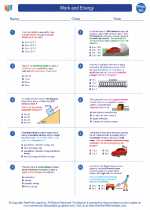Biology
Biology is the study of living organisms and their interactions with the environment. It is a broad field that encompasses various sub-disciplines, including genetics, ecology, physiology, and evolution. Understanding biology is important as it provides insights into the functioning of living organisms and the natural world.
Key Concepts in Biology
- Cell Theory: The cell is the basic unit of life, and all living organisms are composed of one or more cells.
- Genetics: The study of genes, heredity, and variation in living organisms.
- Ecology: The study of the interactions between organisms and their environment.
- Evolution: The process of change in living organisms over time, leading to the diversity of life on Earth.
- Physiology: The study of how living organisms function, including their physical and chemical processes.
Study Guide for Biology
Here are some tips for studying biology effectively:
- Understand the Basics: Start with a good understanding of cell structure, genetics, and the principles of evolution. These concepts form the foundation of biology.
- Use Visual Aids: Diagrams, charts, and models can help you visualize biological concepts such as cellular processes, genetic inheritance, and ecological relationships.
- Practice Active Learning: Engage in activities such as drawing biological structures, solving genetics problems, and conducting experiments to reinforce your understanding of key concepts.
- Stay Updated: Keep abreast of current developments in the field of biology through scientific journals, documentaries, and reputable websites.
- Seek Clarification: If you encounter any challenging concepts, don't hesitate to seek help from your teacher, tutor, or classmates.
- Apply Knowledge: Look for opportunities to apply biological concepts to real-life situations, such as understanding human health, conservation efforts, and agricultural practices.
By mastering the fundamental principles of biology and applying them to practical scenarios, you can develop a deeper appreciation for the complexity and beauty of the living world.
[Biology] Related Worksheets and Study Guides:
.◂Physics Worksheets and Study Guides High School. Work and Energy
Worksheet/Answer key Work and Energy
Work and Energy  Worksheet/Answer key
Worksheet/Answer key Work and Energy
Work and Energy  Worksheet/Answer key
Worksheet/Answer key Work and Energy
Work and Energy  Worksheet/Answer key
Worksheet/Answer key Work and Energy
Work and Energy 

 Worksheet/Answer key
Worksheet/Answer key
 Worksheet/Answer key
Worksheet/Answer key
 Worksheet/Answer key
Worksheet/Answer key

The resources above cover the following skills:
PHYSICAL SCIENCE (NGSS)
Energy
Students who demonstrate understanding can:
Develop and use models to illustrate that energy at the macroscopic scale can be accounted for as either motions of particles or energy stored in fields.